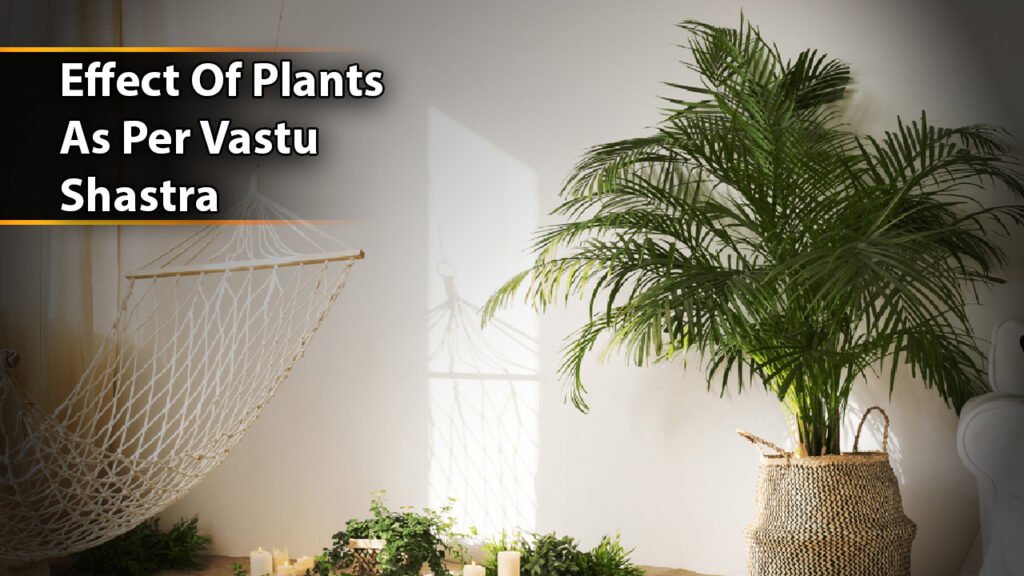Effect Of Plants As Per Vastu Shastra
Vastu Shastra, the ancient Indian science of architecture and design, emphasizes creating spaces that align with natural energies to promote wellbeing, prosperity, and harmony. One of the key elements in Vastu is the use of plants, which are believed to bring positivity, purify the air, and enhance the flow of energy within a home or workspace.
Plants play a vital role in balancing the five elements—Earth, Water, Fire, Air, and Space—that form the foundation of Vastu principles. However, not all plants are considered auspicious or suitable for every area of your living or working space. In this blog, we’ll explore the effects of plants as per Vastu Shastra, their placement guidelines, and how they can transform your environment into a sanctuary of peace and prosperity.
Read blog on: Vastu For West Facing House
Why Are Plants Important in Vastu Shastra?
Plants are living entities that connect us to nature and its healing energies. According to Vastu Shastra, incorporating plants into your surroundings has several benefits:
Positive Energy Flow: Plants absorb negative energies and emit oxygen, promoting a healthier and more vibrant atmosphere.
Improved Air Quality: Certain plants filter toxins from the air, enhancing physical health and mental clarity.
Symbolism of Growth: Plants symbolize growth, abundance, and prosperity, making them ideal for attracting wealth and success.
Connection to Nature: Living in harmony with nature fosters emotional balance and spiritual wellbeing.
However, it’s crucial to choose the right plants and place them strategically to maximize their positive impact while avoiding potential drawbacks.
Auspicious Plants Recommended by Vastu Shastra
Here are some plants recommended by Vastu Shastra for fostering positivity and prosperity:
1. Tulsi (Holy Basil)
Significance: Tulsi is revered in Hindu culture for its spiritual and medicinal properties. It is believed to purify the environment, ward off negativity, and invite divine blessings.
Placement: Ideally placed in the northeast corner of the house or garden, where it can receive morning sunlight. Avoid keeping Tulsi indoors, as it thrives best outdoors.
2. Money Plant (Epipremnum aureum)
Significance: The Money Plant is associated with wealth and financial stability. Its heart shaped leaves are said to attract abundance and good fortune.
Placement: Keep it in the southeast corner of your home or office, which represents the element of Fire and governs wealth. You can also place it near windows or balconies to allow ample light.
3. Areca Palm
Significance: Known for its air purifying qualities, the Areca Palm enhances overall wellbeing and creates a calming ambiance.
Placement: Place it in the east or north directions, as these zones represent new beginnings and career growth, respectively.
4. Jasmine
Significance: Jasmine flowers exude a soothing fragrance that promotes relaxation, love, and harmony among family members.
Placement: Grow jasmine plants in the northwest direction, which governs relationships and social connections.
5. Lucky Bamboo
Significance: Lucky Bamboo is considered highly auspicious for bringing luck, prosperity, and longevity. Each stalk represents different aspects of life, such as wealth, health, and happiness.
Placement: Position it in the southeast corner for wealth enhancement or the east for general wellbeing. Ensure it’s kept in water rather than soil for optimal results.
6. Banana Plant
Significance: The Banana Plant signifies fertility, prosperity, and abundance. It is particularly beneficial for agricultural families or those seeking material gains.
Placement: Grow banana plants in the northeast or north directions, ensuring they receive sufficient sunlight.
Inauspicious Plants to Avoid in Vastu Shastra
While many plants bring positive energy, some are considered detrimental according to Vastu principles. These plants may emit negative vibrations or disrupt the flow of energy:
1. Cactus
Reason: Cacti have sharp thorns that create hostile energy and can lead to conflicts or accidents.
Alternative: If you must keep cacti, place them outside the house or in areas away from high foot traffic.
2. Bonsai Trees
Reason: Bonsai trees are stunted versions of larger plants, symbolizing restricted growth and stagnation. They may hinder personal and professional progress.
Alternative: Opt for full size indoor plants instead.
3. Dead or Dying Plants
Reason: Withered or unhealthy plants signify decay and misfortune. They drain positive energy from space.
Solution: Regularly prune and care for your plants, removing any dead leaves or branches promptly.
4. Thorny Plants (Except Rose)
Reason: Thorny plants generate negative energy and can cause arguments or health issues.
Exception: Roses are an exception due to their association with beauty and romance.
Guidelines for Plant Placement as Per Vastu Shastra
To harness the full benefits of plants, follow these placement tips based on Vastu principles:
1. East Direction
Governs the element of Water and represents health, family, and new opportunities.
Ideal for placing flowering plants like jasmine or lotus, as well as water features combined with greenery.
2. North Direction
Associated with career growth and financial stability.
Suitable for tall plants like banana trees or bamboo, which support upward movement and expansion.
3. Southeast Direction
Represents the element of Fire and governs wealth and prosperity.
Perfect for money plants, lucky bamboo, or other auspicious plants linked to abundance.
4. Northeast Direction
Known as the zone of spirituality and knowledge.
Best for sacred plants like Tulsi or small herbal gardens that promote learning and enlightenment.
5. Southwest Direction
Symbolizes strength, stability, and grounding.
Avoid placing plants here, as excessive foliage can destabilize the energy of this zone.
6. Avoid Overcrowding
Too many plants in one area can block the flow of natural light and fresh air, leading to stagnation and imbalance.
Maintain a balance between open spaces and greenery for optimal energy circulation.
FAQs About Plants in Vastu Shastra
- Can I keep artificial plants as per Vastu?
Artificial plants lack life force and cannot purify the air or emit positive energy. While they may be used sparingly for decorative purposes, real plants are always preferred in Vastu.
- Is it okay to keep plants in the bedroom?
Yes, but only specific plants like aloe vera or snake plants, which release oxygen at night, are suitable for bedrooms. Avoid large or thorny plants, as they can disturb sleep and create negative energy.
- What should I do if my plant dies unexpectedly?
The sudden death of a plant could indicate blocked or negative energy in that area. Remove the plant immediately, cleanse the space with saltwater or incense, and replace it with a healthy one.
- How often should I change the water in lucky bamboo arrangements?
Change the water every two weeks to prevent stagnation and maintain the plant’s vitality. Clean the container regularly to avoid mold or algae buildup.
- Can I grow vegetables or herbs indoors as per Vastu?
Yes, growing vegetables or herbs indoors is highly auspicious, especially in the northeast or east directions. It promotes self sufficiency and connects you to the nourishing energy of nature.
- Does the size of the plant matter in Vastu?
Yes, the size of the plant should correspond to the available space. Large plants suit spacious areas like living rooms or gardens, while smaller ones work better in compact spaces like offices or kitchens.
If you want to watch Astrology Videos visit our: YouTube channel
Conclusion of Plants in Vastu Shastra
Incorporating plants into your home or workspace as per Vastu Shastra can significantly enhance the flow of positive energy, improve air quality, and foster a sense of tranquility. By choosing auspicious plants and placing them strategically, you can create an environment that supports your physical, emotional, and spiritual wellbeing.
Remember, Vastu is not just about rigid rules; it’s about cultivating mindfulness and respect for the natural world. Let plants become your allies in building a harmonious and prosperous life. Embrace the wisdom of Vastu Shastra, and watch as your surroundings transform into a haven of peace and positivity!

